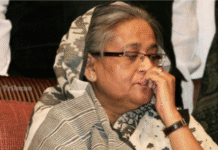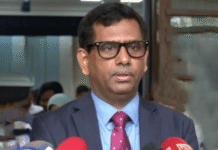
Bangladeshi men who surrendered to authorities and admitted involvement in the drug trade sit in front of police in Teknaf, a border town next to Myanmar’s Rakhine state, on February 16, 2019. Photo: AFP
‘Godfathers’ surrender but meth keeps flowing
The surrender of dozens of drug dealers has failed to fully stem the flow of ‘yaba’ into Bangladesh
Despite the surrender of 102 alleged “godfathers” and their associates in Bangladesh, shipments of methamphetamines, or yaba, from Myanmar keep coming, The Daily Star newspaper reported.
The Bangladesh government has a list of 43 drug traffickers and their family members who have not yet surrendered to the authorities. “A dozen ‘yaba’ dealers in Myanmar send ‘yaba’ shipments to Bangladesh once they receive orders from these godfathers,” the paper wrote on February 17.
Drugs manufactured in Myanmar enter Bangladesh near Cox’s Bazar in the southeast, a long-time haven for smugglers of all kinds of goods. The Bangladesh government has launched a surrender program under which drug traffickers will not receive any general amnesty but will have to face legal action.
Ten of those who have surrendered so far were elected local politicians, while 35 were so-called “godfathers” and the rest just dealers. Despite this, the Bangladesh Department of Narcotics Control said that 8,200 pills had been seized in the border town of Teknaf alone over the first 16 days of February.
According to Bangladesh government statistics, there are nearly a million drug addicts in the country and the crisis has reached epidemic proportions. The surrender program is one way in which the authorities are dealing with the problem.
Other recommendations, according to the paper, are to increase vigilance on Rohingya refugee camps in the Cox’s Bazar area, while monitoring the transfer of Bangladeshi police with have links to traffickers, and taking action against Myanmar border police suspected to be involved in smuggling.
Bangladesh border officials allege that the Rohingya refugee camps have “turned into a drug zone where clashes are on the rise over money, narcotics and illicit relations” across the border.









